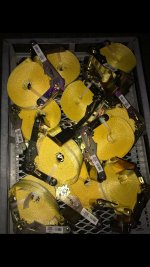ptsg
Super Member
I totally agree with you. Both designs work just fine.
I'm still new to the trailer world. I'm still waiting on the date for the driving license, that the IMT ( DMV overthere I believe) seems to take forever to proceed with the process, even though I delivered and paid the file in April.
I don't really have a % of tongue weight. Usually I measure the ball hitch to the ground when empty, and then measure it again when loaded to get some numbers to make it easier on the future loads and kinda look at it from a couple feet away to see how it sits. Anyway, if the rear of the truck didn't lift compared to when it was empty, then I'm good I guess?
I'm still new to the trailer world. I'm still waiting on the date for the driving license, that the IMT ( DMV overthere I believe) seems to take forever to proceed with the process, even though I delivered and paid the file in April.
I don't really have a % of tongue weight. Usually I measure the ball hitch to the ground when empty, and then measure it again when loaded to get some numbers to make it easier on the future loads and kinda look at it from a couple feet away to see how it sits. Anyway, if the rear of the truck didn't lift compared to when it was empty, then I'm good I guess?

